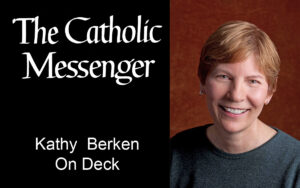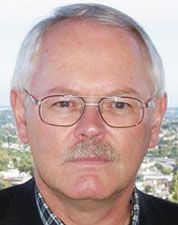 By Kathy Berken
By Kathy Berken
On Deck

Until recently, there hasn’t been enough support and conversation in our parishes and religious communities about the spirituality of our “wisdom years,” says author and teacher Father Ronald Rolheiser, OMI. In an attempt to bring people together for a comprehensive experience of education, community-building and spiritual experiences, he began the two-year ecumenical program called Forest Dwelling, which I attended and wrote about here in 2019.
About 100 people ages 60 to 80 from around the world gathered in San Antonio, Texas for four, one-week intensives — spread out over two years — to listen, discuss, interact and experience life focused on the spirituality of aging. In between, we met in small groups over Zoom for two hours monthly. In sharing similar thoughts, feelings and experiences, we felt that we were not alone as we lose loved ones, face increasing health issues and, eventually, death.
We spoke about memory loss, physical disabilities, living alone, family issues around our aging, and how God fits in to all of it. Two Canadian participants developed an offshoot of Forest Dwelling, called Growing in Wisdom, an exclusively virtual program at the Oblate of Mary retreat center in Saskatchewan. Sarah and Nancy continue the vision and focus of Forest Dwelling and have added book studies, as well as “spiritual and intellectual materials, ideas, experiences, people, poetry, arts and Mystery” (growinginwisdom.ca).
What’s important here is not whether you sign up for either one of these programs and attend the sessions, read the materials or engage in the practices, but whether you or someone you know in their “wisdom years” has opportunities to connect with others to talk meaningfully about aging. Here are some other helpful resources:
- Richard F. Groves began a revolution in the area of death and dying with his 2009 publication of “The American Book of Living and Dying: Lessons in Healing Spiritual Pain.” An internationally renowned teacher of these sacred arts, Groves created the “Anamcara Project,” a unique training program based on the tenets of his book. It is available for health care professionals, faith community leaders and the public. You can find virtual and in-person event information on his website: sacredartofliving.org.
- The Spiritual Care Association offers a self-guided course for health care professionals and others who work in the field of palliative care to provide “skills and knowledge specific to the importance of spirituality as a core element in the provision of palliative care” (spiritualcareassociation.org). Founded in 2016, SCA is “the first multidisciplinary, international professional membership association for spiritual care providers that establishes evidence-based quality indicators, scope of practice, and a knowledge base for spiritual care.”
- The Chaplaincy Innovation Lab (chaplaincyinnovation.org) teaches chaplains “to nurture the spirits of those they serve and reduce human suffering.”
- The mission of the Interfaith Spiritual Care Coalition at the Institute for Spirituality and Health is to “empower spiritual care volunteers to serve in the healthcare community through recruitment, certified training, and partnership with healthcare agencies” (spiritualityandhealth.org/iscc).
“Being fully present to the burdens and blessings of the aging process invites us into acceptance of the final season of our lives,” Sarah and Nancy say. “We encounter a shift from activities of achievement and being self-important to one of fruitfulness, passivity and facing our deaths, often within spiritual darkness. The aging process is ‘bringing us into the deeper realm of the spiritual’” (Kathleen Dowling Singh).
The final chapter of our life story may include ways to continue to learn to live in a new understanding of the body of Christ in all the sacraments, deepening our awareness of God’s presence, living with hope in the resurrection for ourselves, and discovering peace in experiencing our gifts of wisdom and shared humanity.
(Kathy Berken is a spiritual director and retreat leader in St. Paul, Minnesota. She lived and worked at L’Arche in Clinton — The Arch from 1999-2009.)








